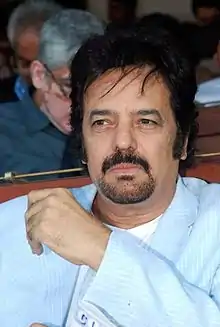Akbar Khan (director)
Akbar Khan (born 7 July 1949) is an Indian film actor, screenwriter, producer and director. He is the youngest brother of the Indian actor, producer, editor and director, Feroz Khan and Sanjay Khan.
Akbar Khan | |
|---|---|
 | |
| Born | 7 July 1949 |
| Nationality | Indian |
| Occupation | Film director, Screenwriter, Producer |
| Parent(s) | Sadiq Ali Khan (father) Fatima (mother) |
| Relatives | Feroz Khan (brother) Sanjay Khan (brother) Sameer Khan (brother) |
Early life
Akbar was born on July 7, 1949 in Bangalore, India, to Sadiq Ali Khan Tanoli and Fatima. His father was an Afghan and from Ghazni and belonged to Tanoli people, while his mother hailed from Iran. His brothers are the legendary actor-filmmaker Feroz Khan, actor-filmmaker Sanjay Khan, Sameer Khan and Shahruq Khan. His sisters are Dilshad and Khurshid.[1][2][3][4]
Khan was educated at Bishop Cotton Boys' School, Bangalore and St. Germain High School, Bangalore.
Career
Akbar started his career as an assistant director to some filmmakers and after some years of assisting made his debut in Anjaan Rahain (1974), which starred his brother Feroz in the main lead. He was also assistant director to his brother Feroz in Apradh (1972). After acting in a couple of films, Akbar turned producer-director with Haadsa (1983), starring himself in the lead. He also starred in his brother Sanjay Khan's directorial venture Kala Dhanda Gorey Log (1986). After acting in Aakarshan (1988), Akbar turned his attention to the TV industry and directed the first 20 episodes of his brother Sanjay Khan's epic TV Serial, The Sword of Tipu Sultan. The serial is regarded as a cult classic in the Indian TV industry.
Akbar produced-directed and also played the title role of Emperor Akbar in the classic TV serial Akbar The Great. In 2005, Akbar produced-directed the magnum opus Taj Mahal: An Eternal Love Story. He also launched Pakistani legend actress-singer Noor Jehan's granddaughter Sonya Jehan in the film, which also starred Kabir Bedi, Zulfi Syed, Arbaaz Khan and Pooja Batra. It was the costliest film made in India at that time, with a budget of INR 60 crores. It was also the first Indian film to release in Pakistani cinemas, as Indian films were banned there since the Indo-Pak war of 1965. Akbar, along with his family and other Indian film stars also visited Pakistan in April 2006 and actively promoted the film. The film was badly sabotaged and ill-marketed in India by Mukta Arts, which led to a dispute between Akbar, Subhash Ghai and Yash Chopra. The film was highly appreciated at nearly all international film festivals. Akbar plans to re-release the film in India and abroad very soon, as many people didn't know that it actually released in 2005. Akbar starred in Vashu Bhagnani's Faltu (2011) and played the main lead in Faraar (2011).
He is into the petrochemical business with his company Abraiz Petrochemicals. Akbar also has some business interests in Iran. He lives at Oberoi Enclave in Juhu, Mumbai near his late brother Feroz's bungalow.
Filmography
Actor
| Year | Film | Character |
| 1974 | Anjaan Raahen | Rajan |
| 1983 | Haadsaa | Jai Kumar |
| 1986 | Swati | Ram Mohan |
| Kala Dhanda Goray Log | Ramu | |
| Jumbish: A Movement: The Movie | Sagar/Manas | |
| 1987 | Muqaddar Ka Faisla | Dr. Harish |
| Panchavati | Yatin | |
| 1988 | Akarshan | Abhishek |
| 1989 | Tujhe Nahin Chhodunga | |
| 1990 | Chahungi Tujhe Bar Bar | |
| 2004 | Escape From Taliban | Sawali |
| 2011 | F.A.L.T.U | Cameo |
| 2013 | Shootout at Wadala | Haji Masood |
Movie
| Year | Movie |
| 1983 | Haadsaa |
| 2005 | Taj Mahal: An Eternal Love Story |
Television
| Year | Serial | Character |
| 1988-89 | Akbar - The Great | Jalaluddin Akbar |
| 1990-91 | The Sword of Tipu Sultan | |
References
- "'I have never known FEAR'". Indian Express. The Indian Express ltd. Retrieved 10 December 2020.
- "Feroz Khan: 1939-2009". Rediff.com. Retrieved 10 December 2020.
- "Feroz Khan lived life king size". Times of India. Bennett, Coleman & Co. Ltd. Retrieved 10 December 2020.
- "How a movie star cheated death". Rediff.com. Retrieved 10 December 2020.